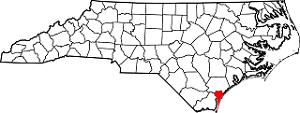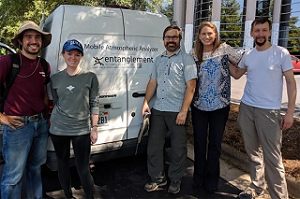Hot Off the Press
Research Briefs
Sampling Device Harnesses Powerful Molecular Interactions, Overcomes Barriers in Detecting Volatile Contaminants: A NIEHS Superfund Research Program (SRP)-funded study showed how unique microsensors that harness powerful molecular interactions can selectively detect trace amounts of aromatic volatile organic compounds (VOCs) in the environment.

PFAS Exposure Associated with Elevated Cholesterol in North Carolina Community: NIEHS SRP-funded researchers found that elevated levels of per- and polyfluoroalkyl substances (PFAS) in the blood of participants of the GenX Exposure Study were associated with higher cholesterol. Led by Jane Hoppin, ScD., of the North Carolina State University SRP Center, the study started in 2017 in response to the concerns of residents of Wilmington, North Carolina, about PFAS in their drinking water.
Disentangling Relationships Between Arsenic and the Gut Microbiome: Using an innovative method to simulate the gastrointestinal (GI) system, researchers from the University of North Carolina at Chapel Hill SRP Center revealed the interplay between arsenic exposure and the gut microbiome. The scientists assessed how arsenic alters the microbiome and how much arsenic can be dissolved into the bloodstream after being broken down by the gut, also known as bioaccessibility.
Environmental Factor Articles

NIEHS Director tours Texas community, speaks at research center event: Rick Woychik spoke at Texas A&M University (TAMU) on October 27 to celebrate the renewal of TAMU's SRP P42 grant. Woychik delivered remarks regarding the future of environmental health sciences at the event, visited faculty and graduate students in the toxicology and genetics programs, and explored the TAMU Institute of Biosciences and Technology in Houston.
Extramural Paper of the Month: Alligators exposed to elevated levels of PFAS show signs of immune disruption: American alligators could help scientists understand the consequences of long-term exposure to PFAS mixtures, according to researchers at the North Carolina State University (NCSU) SRP Center.
Extramural Paper of the Month: Gut microbiome associated with arsenic metabolism in infants: Microbes in the human digestive system may complement a person's ability to metabolize arsenic, particularly in the first few weeks of life, according to a study funded partly by SRP.

Chemical toxicant contributes to low birth weight, can damage placenta: Exposure to trichloroethylene during pregnancy may result in poor birth outcomes, says former Karen Wetterhahn Award recipient Elana Elkin.
SRP, Pacific Basin Consortium promote health: Children's health, nutrition, and more were featured at the Pacific Basin Consortium for Environment and Health annual conference, which brought together global experts to discuss advancing environmental health.
Climate, chemicals, and Carolina focus of NCSOT annual conference: At the North Carolina Society of Toxicology meeting, NIEHS grantees and trainees discussed how extreme weather affects health outcomes.
Role of complex exposures in breast cancer highlighted during workshop: Current breast cancer research and efforts to evaluate how combined exposures can influence the disease were discussed during an NIEHS-led event.

Superfund Research Program trainees win prestigious K.C. Donnelly awards: Seven trainees with the NIEHS SRP have earned K.C. Donnelly Externship Award Supplements, which enable graduate students and postdoctoral researchers to learn techniques relevant to their work from experts at outside institutions.
PFAS, worker safety, data sharing, and more on tap at Council meeting: The National Advisory Environmental Health Sciences Council approved the continuation of a key funding mechanism for SRP during its 167th meeting, held September 13-14.
Collman named to inaugural fellows' cohort at international conference: NIEHS held a strong presence at the 34th Annual Conference of the International Society for Environmental Epidemiology (ISEE), held online and in-person September 18-21 in Athens, Greece.
Extramural Paper of the Month: Triclosan can be passed through milk, increase risk of liver disease: UC San Diego SRP researchers found that newborn mice can be exposed to the antibacterial chemical triclosan through breastmilk, leading to increased liver disease risk.
Extramural Paper of the Month: Link between exposure to wildfire smoke and cardiovascular harm revealed: SRP researchers at the University of North Carolina at Chapel Hill (UNC) uncovered the biological mechanisms by which exposure to wildfire smoke harms the heart and lungs in mice.
Hot Publications
Check out our new Hot Publications page to see brief summaries of papers that have been featured as the hot publication in the monthy e-Posted Notes newsletter!
to Top



